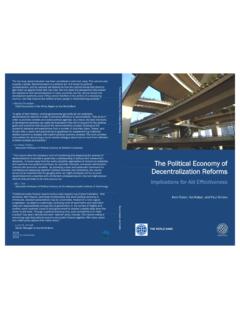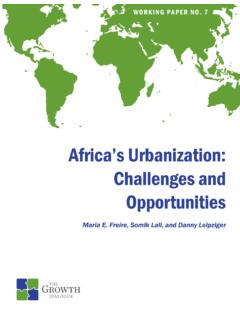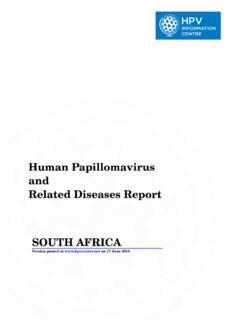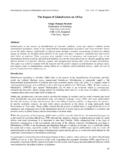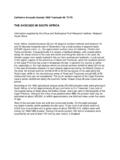Transcription of Why Are There So Many Civil Wars in Africa? Understanding ...
1 Why Are There So many Civil wars in africa ? Understanding and Preventing Violent Conflict Ibrahim Elbadawi Nicholas Sambanis Forthcoming in the Journal of African Economies (December 2000) ABSTRACT Contrary to popular belief, africa 's Civil wars are not due to its ethnic and religious diversity. Using recently developed models of the overall prevalence of Civil wars in 161 countries between 1960-1999, we draw lessons with special reference to africa , showing that the relatively higher prevalence of war in africa is not due to the ethno-linguistic fragmentation of its countries, but rather to high levels of poverty, failed political institutions, and economic dependence on natural resources. We argue that the best and fastest strategy to reduce the prevalence of Civil war in africa and prevent future Civil wars is to institute democratic reforms that effectively manage the challenges facing africa 's diverse societies.
2 To promote inter-group cooperation in africa , specially tailored political governance and economic management institutions are needed and we advance some hypotheses on the nature of such institutions. We suggest that africa s ethnic diversity in fact helps --it does not impede-- the emergence of stable development as it necessitates inter-group bargaining processes. These processes can be peaceful if ethnic groups feel adequately represented by their national political institutions and if the economy provides opportunity for productive activity. World Bank, DECRG, 1818 H Street, NW., Washington DC 20433. The authors can be contacted at: and The opinions expressed in this paper are the authors and do not necessarily represent the World Bank or its Executive Directors.
3 1 1. Introduction Over the last 40 years nearly 20 African countries (or about 40 percent of africa south of the Sahara (SSA)) have experienced at least one period of Civil war. It is estimated that 20% of SSA s population now lives in countries which are formally at war and low-intensity conflict has become endemic to many other African states. This state of affairs has created stereotypes of africa as a doomed continent with inescapable ethnic cleavages and violent tribal conflict. The more incidents of political violence we observe in africa , the more support for this simplistic and negative perception. However, careful analysis of the determinants of Civil wars in africa and a systematic comparison to other regions points to a more complex picture. Deep political and economic development failures --not tribalism or ethnic hatred-- are the root causes of africa 's problems.
4 The implication is that political and economic development can effectively reduce or eradicate political violence in africa . In this paper, we focus explicitly on such a comparison between africa and other regions, drawing on a detailed and more technical empirical analysis of Civil war that we have conducted Our analysis is based on the concept of prevalence (or amount) of Civil war and we try to model its determinants. The concept of war prevalence is equivalent to the concept of the overall amount of Civil war that one might observe in a given period, regardless of whether or not the war started during that period or We focus on 1 Ibrahim A. Elbadawi and Nicholas Sambanis, 2000, "How Much War Will We See?
5 Estimating the Prevalence of Civil War in 161 Countries," World Bank Working Paper. Henceforth Elbadawi and Sambanis (2000a) 2 We define the probability of incidence of Civil war at any given time (t) as a probability of two disjoint events. The first event is that war happens at time (t) conditional on the event that There was no war at time 2overall prevalence rather than on war starts so that we can address the question of the overall amount of Civil war in africa and because it is often difficult to separate closely spaced war initiations in the same country. Based on the evidence we observe and analyze, we propose a broad strategy of war prevention. Our empirical analysis is based on estimating an empirical model of the probability of observing an incident of Civil war in any one of 161 countries between 1960-1999.
6 We are able to show that the relatively high prevalence of Civil war in africa is not due to extreme ethno-linguistic fragmentation, but rather to high levels of poverty, heavy dependence on resource-based primary exports and, especially, to failed political institutions. Simulations of the effect of political liberalization and economic development on the probability of Civil war show that the best --and fastest-- strategy to reduce the prevalence of Civil war in africa is to institute democratic reforms that effectively manage the socio-cultural diversity of African societies. We realize that Civil wars in socially diverse societies represent an extreme failure of inter-group cooperation and argue that the best conflict prevention strategy is to build institutions for political governance and economic management.
7 We assess the extent to which africa s social diversity promotes or impedes this process and consider what type of institutions are capable of mitigating the potentially negative consequences of diversity. In section 2 we discuss the causes of Civil wars , presenting some stylized facts about their prevalence, intensity and duration as well as some basic data on related (t-1). The second event is that war is observed at time (t), having been initiated at an earlier period. Thus, the probability of incidence of Civil war is equal to the probability of war onset or initiation plus the probability that a war will last more than one period.
8 This concepts unifies earlier literature, which focuses either on onset of new wars ( Collier and Hoeffler, 1999) or duration of war (Collier, Hoeffler and Soderbom, 1998). 3variables in africa and other regions. We use our Elbadawi and Sambanis (ES) model (2000a) to explain the high prevalence of Civil wars in africa as compared to other regions. In section 3, we explore if and by how much improvements in political rights, standards of living and economic diversification influence the risk of Civil war. The evidence from this exercise provides a basis for developing a strategy to war prevention. In the concluding section, we use our empirical analysis to make some policy recommendations. We argue that a prevention strategy would not be complete without a deep Understanding of how political and economic governance institutions interact with social diversity.
9 While we cannot enter into a full discussion of the nature of peacebuilding institutions, we point to the need for further research on the relationship between political institutions and violence in africa . 2. Understanding the Causes of Conflicts in africa africa has a high prevalence of Civil wars and this is commonly attributed to the ethnic diversity of its countries. This inference seems self-evident to many , given that African rebel movements almost always are ethnically defined. Ethnic identities and hatred are thus seen as the cause of violent conflict. However, more systematic analysis of the causes of Civil war suggests that africa s Civil wars conform to a global pattern that is better explained by political and economic factors as well as by the extent of ethnic, cultural and religious diversity in the Recent studies have found that the risk of Civil war is reduced by the opportunity cost of rebel labor (proxied by indicators of 4economic development, such as per capita GDP or educational attainment).
10 Up to a certain range, natural resources are associated with higher risk of war, though for a substantial natural resource base the relationship is expected to turn negative. Natural resources provide easily lootable assets for loot-seeking rebel movements or convenient sources for sustaining justice-seeking movements (Collier and Hoeffler 2000). However, extremely plentiful resources may also provide sufficient revenues that the government can use to fund its army and "buy" popular support. The literature on Civil wars also suggests that social diversity can have several offsetting effects that may reduce the risk of large-scale violent conflict. This may happen because rebel cohesion may be a function of the degree of ethnic or religious diversity of the society; in highly diverse societies, the government may be more easily successful in dividing the rebels given that the rebels themselves may have a harder time in gaining support for their cause across a wider range of ethnic groups with potentially diverse preferences.




